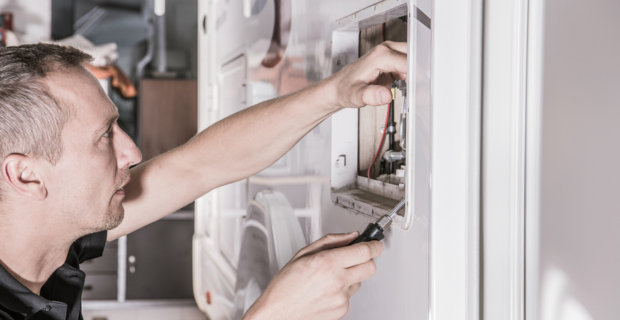Date Published: 2024/07/02
Read Time: mins
What to check for when you smell propane

You have planned your RV trip for months and are finally on the road when you notice a smell that reminds you of rotten eggs. The smell is most likely not eggs but a pungent propane smell instead.
No one ever expects a propane leak to happen to them, but the reality is that this situation can happen to anyone at any time. The important thing is not to panic when you detect an RV propane leak. Just the fact that you can identify the smell means that you can correct the situation before it causes harm to yourself, your family, or your RV.
What to check for when you smell propane
Most propane leaks originate in broken or cracked fittings or propane lines, so we recommend that you check there first. The age of your propane tank and how often you use it to provide power for your furnace, grill, refrigerator, stove, and water heater can factor into whether and how often a leak develops. Checking your propane tank for cracks before heading out in your RV each time can prevent an emergency on the road.
Propane can cause considerable harm to people and animals by releasing a colorless, flammable, and tasteless liquid gas. People who breathe in the liquid gas produced by propane will cough and have labored breathing. Diarrhea and convulsions are the main symptoms of propane poisoning, in addition to breathing issues.
Please seek immediate medical attention for anyone who suddenly develops any of the symptoms listed above. Prolonged exposure to propane can cause permanent brain damage or even death. Although using propane is a normal part of camping in an RV, everyone needs to respect how deadly it can be.
Safety improvements in recent years
RV manufacturers understand that a propane leak can be deadly. The rotten egg smell you notice comes from an extra liquid that manufacturers add to propane to help people detect leaks. Alarms located on the floor close to the propane tank are another safety measure that RV manufacturers have taken to keep people safe. The alarm system is possible because propane is heavier than air.
How to know if your propane tank is leaking
We recommend that you check your propane tank for leaks at least once a year, preferably at the start of the RV camping season. You can bring your RV to a dealership for this service or check for leaks yourself at home. Below are a few methods you can use if you prefer the do-it-yourself route.
Detect pressure drops with a dial manometer
If you want to check for pressure drops in your propane tank, this tool is an efficient way to do it. The manometer tool not only measures pressure in your propane tank, but it provides real-time data about any suspected leaks.
Find the leak with a GasSaf propane leak detector
This tool can detect propane leaks and prevent the flow of propane through the tank if it finds one. You can also use the GasSaf propane leak detector tool to monitor your current propane levels.
Follow the odour
When you notice that telltale rotten egg smell, follow it until you reach your propane tank. Try to determine which part of the propane tank has the strongest odour and use a basting brush dipped in soapy water to draw lines indicating the location of the leak.
How to repair a propane leak
Once you have located a leak, open the windows of your RV and eliminate any fire source by turning off appliances and open flames. You also want to keep your mobile phone away from the propane tank. Next, spray the tank with a solution containing dishwashing liquid and warm water. Be sure to pay special attention to its gauges and valves while spraying.
You now want to locate the main gas supply valve on your propane tank and turn it off. For minor leaks, tightening the screws located on the valve’s gauge is usually sufficient. Larger leaks require assistance from a professional. Safety First! Propane can kill. Never hesitate to seek help from a professional
Don’t forget to check your Insurance coverage
You have a lot on your mind when preparing for an RV trip, which makes it easy to overlook updating your insurance. We invite you to contact Orbit Insurance Services before your first trip of the season to make sure that you have all the protection you need to help you have a carefree summer.
The smell of rotten eggs is a clear warning that the propane tank in your RV has a leak. Here is what you need to do once you notice the offensive odour.
Sources
A Beginner's Guide To An RV's Propane System (rvchronicle.com)